职高英语基础模块下unit1.doc
- 格式:doc
- 大小:112.50 KB
- 文档页数:6


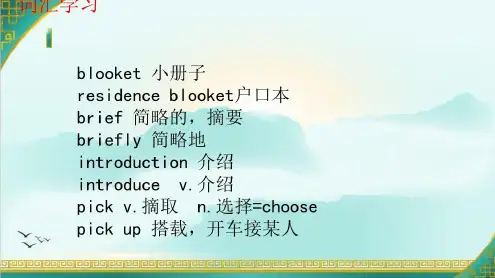
子之-blooket小册子-residence blooket户口本-brief简略的,摘要-briefly简略地-introduction介绍-ntroduce v.介绍-pick v.摘取n.选择=choose-pick up搭载,开车接某人-回包女回回回回回回回回包回回女回回回女回西西山回女包山回女回西回回回女口西回女包回包女回女回女回西回西famous著名的-=noted/outstanding-be famous for因...而著名-wonder vt.想知道=want to kow-she wondered how to do it.-located位于-locator?定位器-be located in坐落于-perid时期时间段-periodcally adv.定期地-回包女回回回回回回回回包回回女回回回女回西西包山回女包山回女回西回回回女口西回女包回包女回女女回西回西protect v.保护-protection-n.保护-protective adj..保护的-unify使统一-unification n.统-link v.连接n.失联,关系-extend a house:扩建房子-population人口=people-与⊙女回回回5口▣回5已G回5回回5@g已四包四gu@四@女包▣口G口5d回口回包5包回回5回5回5回西回5carry out执行-total=-the whole amount,总数,总计-·Natural heritage自然遗产-constructon site建筑地-alarming使人惊动的-alarm n.惊恐=」frighten-alarm system警报系统-互包回包回回回包回包包回回互包回包百回互回回回山回回包山@回回世包回包回回回5雪回互包回包回回回回回回回包回No smoking禁止吸烟-。
excitement n.兴奋-·capitalism资本主义-。
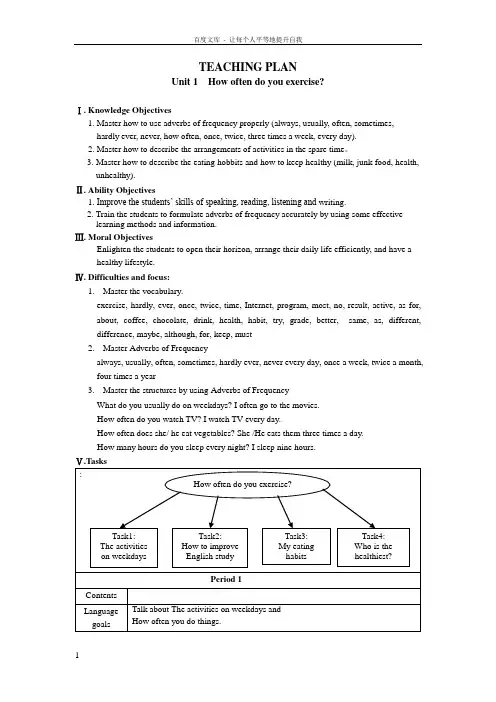
TEACHING PLANUnit 1 How often do you exercise?Ⅰ. Knowledge Objectives1. Master how to use adverbs of frequency properly (always, usually, often, sometimes,hardly ever, never, how often, once, twice, three times a week, every day).2. Master how to describe the arrangements of activities in the spare time。
3. Master how to describe the eating hobbits and how to keep healthy (milk, junk food, health,unhealthy).Ⅱ. Ability Objectives1. Improve the students’ skills of speaking, reading, listening and writing.2. Train the students to formulate adverbs of frequency accurately by using some effectivelearning methods and information.Ⅲ. Moral ObjectivesEnlighten the students to open their horizon, arrange their daily life efficiently, and have a healthy lifestyle.Ⅳ. Difficulties and focus:1.Master the vocabulary.exercise, hardly, ever, once, twice, time, Internet, program, most, no, result, active, as for, about, coffee, chocolate, drink, health, habit, try, grade, better, same, as, different, difference, maybe, although, for, keep, must2.Master Adverbs of Frequencyalways, usually, often, sometimes, hardly ever, never every day, once a week, twice a month, four times a year3.Master the structures by using Adverbs of FrequencyWhat do you usually do on weekdays? I often go to the movies.How often do you watch TV? I watch TV every day.How often does she/ he eat vegetables? She /He eats them three times a day.How many hours do you sleep every night? I sleep nine hours.:Period 1ContentsLanguage goals Talk about The activities on weekdays and How often you do things.How often do you exercise?Task1: The activities on weekdaysTask2:How to improveEnglish studyTask4:Who is thehealthiest?Task3:My eatinghabitsTarget language What do you usually do on weekends? How often do you watch TV?V ocabulary How often, sometimes, hardly ever, twice, once, time, never, Internet, program Task Survey your friends: The activities on weekdaysWhat do you usually / often / sometimes / hardly ever / never do on weekdays?Teaching Procedures Step1: Lead inShow the students some different activities by asking What do you usually do on weekends during the summer holidays?I often go to the movies. / I sometimes go swimming. / I never go fishing. Step2:Present words and phrases: always, usually, often, sometimes, hardly ever, never…What do you do on weekends?I always / usually/ often/sometimes/hardly ever/never…Step3: Activity 1a-1b1.Make a list of the different weekend activities. 1a2.Play the tape. The Ss listen and write the letters. 1b3.Practice in pairs.Step4: Make a conversationLearn how to express the times. Once, twice, three times, four times How often does he /she do his homework/ surf the internet/…?He /She does his homework/ surfs the internet/… every day/ oncea week/ twice a month/ four times a year/…?Step5: Activity 2a-2b1.Play the tape. The Ss listen and number the activities.2.Listen again. Match the activities with the number of times he doesthem.Step6: Task1 The activities on weekdays1.Read the conversation 2c.2.Make a survey: Ask and answer in pairs, then fill in the chart.Step7: Report and then write them down.Report your and your friend’s activities on the weekdays.Summary and do exercises.Period 2Contents P3LanguagegoalsTalk about how often the students do things at school.Target language How often do you read English books? How often does he /she do home work? All / Most/ some /No students exercise once or twice a week.V ocabulary all…, most…, some…, no…, the result , as for Task How to Improve English StudyTeaching ProceduresA guessing game for activities on weekends.Step2: Ask and answerWhat do you do on weekends?I always / usually/ often/sometimes/hardly ever/never…How often does he / she exercise /…?He / She exercises once or twice a week.Step4: Activity 31.Read and learn the information in the charts carefully.2.learn how to use “ all , most, some, no ”3.Learn the new words : result, as for4.Read the magazine carefully and fill in the blanksStep5: Make a survey1. Survey: Class Activities in groups.2. Make a report according to Activity3.Step6: Task 2Make a survey: How to improve our English?Teacher introduces the activity. How to improve our English? How do we study English well? The students answer the questions freely. Write down the answers in the first row. (Speak English , listen to English , keep a diary, …)1.Group work: Who’s the best English student?2.Interview: Improve English Study by asking How often do you readEnglish books/ sing English songs/watch English programs/listen toEnglish tapes/join the English corner/chat with foreigner…?3.Ask classmates the questions. And write down them in the chart. Step7: Report and write it downThe good habits for English studySummary and do exercisesPeriod 3Contents P4Language goals How often do you eat vegetables? Talk about the eating habits.Target language How often do you exercise? How often do you drink milk? How many hours do you sleep every night?V ocabulary junk, junk food, milk, health, interviewer Task My eating habits.Teaching ProceduresDiscuss: What do you usually eat? What do you usually drink? Do you have a good eating habit? What do you have to eat and drink if you want to keep healthy?The students talk about them freely.Step2: Present words and phrases:1.junk food, milk, healthy, be bad/ good for2.junk food and healthy food3.Have a contest: Find the healthy food and unhealthy foodStep3: Activity 1a-1b1. Match the words with the pictures. 1a2. Practice the conversation in the box. 1bHow often do you eat fruit / vegetables/ junk food ?I eat/don’t eat them every day, because they are good/bad for myhealthy.Step4: Activity 2a-2b1. Play the tape. The Ss listen and circle the answer to each question.2. Play the tape again. The Ss listen and fill in the blanks in the survey.Check the answers in class.Step5: Role Play1. The Ss work in pairs to ask and answer questions about Katrina andBill.2. Describe the activities of Katrina and Bill with your own words.Step6: Task3 My eating habits1.Talk about the eating habits with each other.2.Fill the chart by individual3.Write it down and then do a report to the class according to the chart. Summary and do exercisesPeriod 4Contents P5-6Language goals Talk a bout the healthy lifestyle, and how we keep healthy.Target language How often does she exercise? Every day.She eats vegetables ten or eleven times a week.V ocabulary Habit, a lot of, of course, look after, difference, grade, lifestyle, unhealthy, yuck, althoughTask Who is the healthiestTeaching Procedures1. Do you think you have a healthy lifestyle? Why or why not?The students talk about them freely.2. Ask questions about Katrina’s habit according to 2b.Step2: Activity 3a1.Learn the new words: Habit, a lot of, of course, look after, make adifference, grade, lifestyle, unhealthy, better, although2.Play the tape. The Ss listen and read.3.Answer the questions.4.Explain the language points in 3a.Step3: Activity 3bFill in the blanks in Bill’s letter.Step4: Do exercise:1.Read three passages about each person. Then circle “healthy” or“un healthy”plete the passage according to Chinese.3.Read the last passage and answer the question.Step5: Task 4: How do you keep healthy?A healthy life styleKeep a healthy diet.Exercise every day. (males / females)Sleep well.Step6: Make a survey Who is the healthiest?1.Make a survey by asking the questions.2.Write it down then report it.Summary and do exercises。
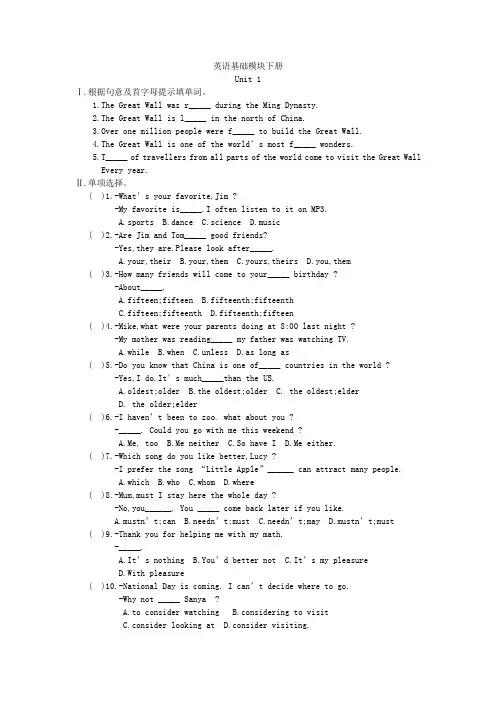
英语基础模块下册Unit 1Ⅰ.根据句意及首字母提示填单词。
1.The Great Wall was r_____ during the Ming Dynasty.2.The Great Wall is l_____ in the north of China.3.Over one million people were f_____ to build the Great Wall.4.The Great Wall is one of the world’s most f_____ wonders.5.T_____ of travellers from all parts of the world come to visit the Great WallEvery year.Ⅱ.单项选择。
( )1.-What’s your favorite,Jim ?-My favorite is_____.I often listen to it on MP3.A.sportsB.danceC.scienceD.music( )2.-Are Jim and Tom_____ good friends?-Yes,they are.Please look after_____.A.your,theirB.your,themC.yours,theirsD.you,them( )3.-How many friends will come to your_____ birthday ?-About_____.A.fifteen;fifteenB.fifteenth;fifteenthC.fifteen;fifteenthD.fifteenth;fifteen( )4.-Mike,what were your parents doing at 8:00 last night ?-My mother was reading_____ my father was watching TV.A.whileB.whenC.unlessD.as long as( )5.-Do you know that China is one of_____ countries in the world ?-Yes,I do.It’s much_____than the US.A.oldest;olderB.the oldest;olderC. the oldest;elderD. the older;elder( )6.-I haven’t been to zoo. what about you ?-_____. Could you go with me this weekend ?A.Me, tooB.Me neitherC.So have ID.Me either.( )7.-Which song do you like better,Lucy ?-I prefer the song “Little Apple”______ can attract many people.A.whichB.whoC.whomD.where( )8.-Mum,must I stay here the whole day ?-No,you______. You _____ come back later if you like.A.mustn’t;canB.needn’t;mustC.needn’t;mayD.mustn’t;must( )9.-Thank you for helping me with my math.-_____.A.It’s nothingB.You’d better notC.It’s my pleasureD.With pleasure( )10.-National Day is coming. I can’t decide where to go.-Why not _____ Sanya ?A.to consider watchingB.considering to visitC.consider looking atD.consider visiting.Ⅲ.将下列句子变成被动语态,每空一词。
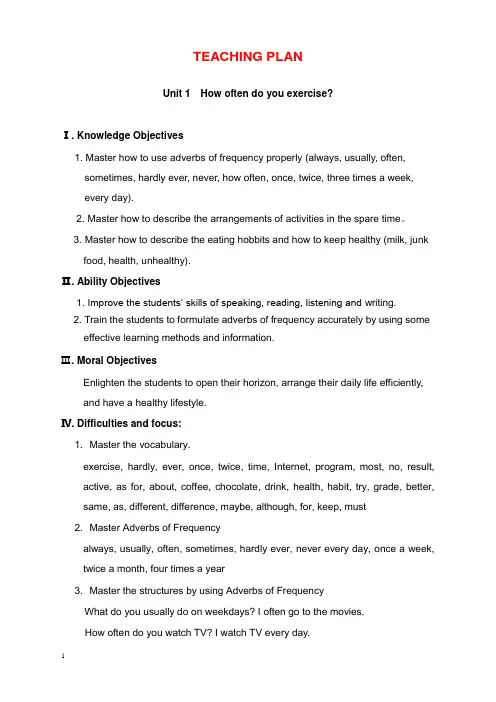
TEACHING PLANUnit 1 How often do you exercise?Ⅰ. Knowledge Objectives1. Master how to use adverbs of frequency properly (always, usually, often,sometimes, hardly ever, never, how often, once, twice, three times a week,every day).2. Master how to describe the arrangements of activities in the spare time。
3. Master how to describe the eating hobbits and how to keep healthy (milk, junkfood, health, unhealthy).Ⅱ. Ability Objectives1. Improve the students’ skills of speaking, reading, listening and writing.2. Train the students to formulate adverbs of frequency accurately by using someeffective learning methods and information.Ⅲ. Moral ObjectivesEnlighten the students to open their horizon, arrange their daily life efficiently, and have a healthy lifestyle.Ⅳ. Difficulties and focus:1. Master the vocabulary.exercise, hardly, ever, once, twice, time, Internet, program, most, no, result, active, as for, about, coffee, chocolate, drink, health, habit, try, grade, better, same, as, different, difference, maybe, although, for, keep, must2. Master Adverbs of Frequencyalways, usually, often, sometimes, hardly ever, never every day, once a week, twice a month, four times a year3. Master the structures by using Adverbs of FrequencyWhat do you usually do on weekdays? I often go to the movies.How often do you watch TV? I watch TV every day.How often does she/ he eat vegetables? She /He eats them three times a day.How many hours do you sleep every night? I sleep nine hours.Ⅴ.Tasks。
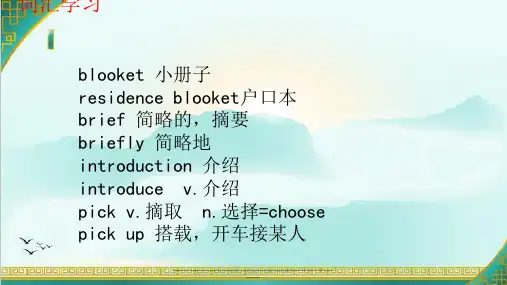
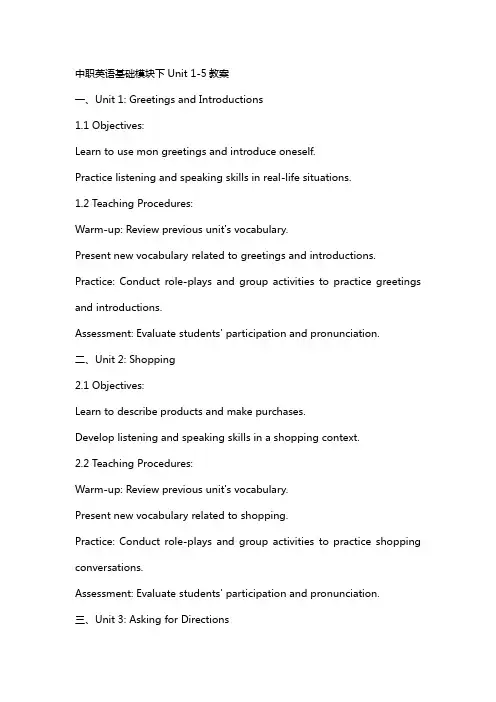
中职英语基础模块下Unit 1-5教案一、Unit 1: Greetings and Introductions1.1 Objectives:Learn to use mon greetings and introduce oneself.Practice listening and speaking skills in real-life situations.1.2 Teaching Procedures:Warm-up: Review previous unit's vocabulary.Present new vocabulary related to greetings and introductions. Practice: Conduct role-plays and group activities to practice greetings and introductions.Assessment: Evaluate students' participation and pronunciation.二、Unit 2: Shopping2.1 Objectives:Learn to describe products and make purchases.Develop listening and speaking skills in a shopping context.2.2 Teaching Procedures:Warm-up: Review previous unit's vocabulary.Present new vocabulary related to shopping.Practice: Conduct role-plays and group activities to practice shopping conversations.Assessment: Evaluate students' participation and pronunciation.三、Unit 3: Asking for Directions3.1 Objectives:Learn to ask for and give directions.Improve listening and speaking skills in a navigation context.3.2 Teaching Procedures:Warm-up: Review previous unit's vocabulary.Present new vocabulary related to asking for directions.Practice: Conduct role-plays and group activities to practice asking for directions.Assessment: Evaluate students' participation and pronunciation.四、Unit 4: Hobbies and Interests4.1 Objectives:Learn to describe hobbies and interests.Enhance listening and speaking skills in a leisure context.4.2 Teaching Procedures:Warm-up: Review previous unit's vocabulary.Present new vocabulary related to hobbies and interests.Practice: Conduct role-plays and group activities to practice describing hobbies and interests.Assessment: Evaluate students' participation and pronunciation.五、Unit 5: Family and Friends5.1 Objectives:Learn to describe family members and friends.Strengthen listening and speaking skills in a personal relationship context.5.2 Teaching Procedures:Warm-up: Review previous unit's vocabulary.Present new vocabulary related to family and friends.Practice: Conduct role-plays and group activities to practice describing family members and friends.Assessment: Evaluate students' participation and pronunciation.这只是一个初步的教案框架,您可以根据具体的教学需求和时间进行调整和补充。
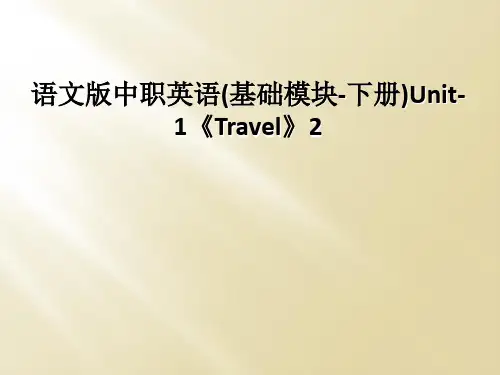
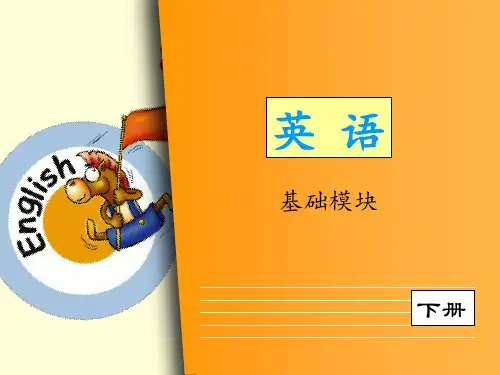
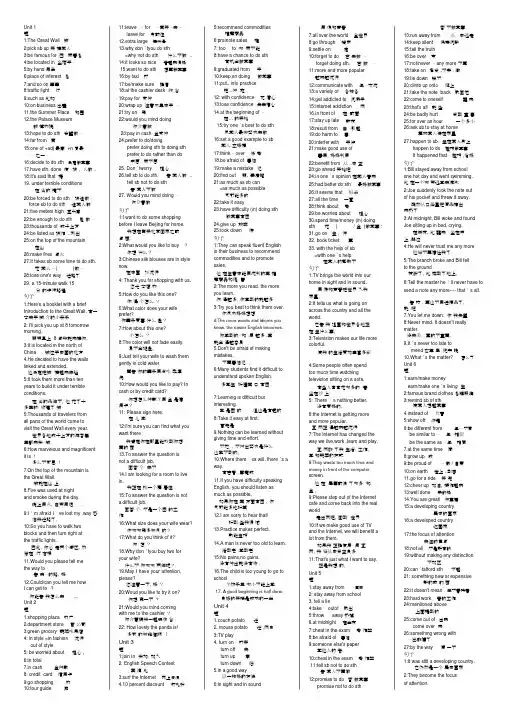
Unit 1短1:The Great Wall 城2:pick sb up 开接某人3:be famous for 因⋯而著名4:be located in 坐落于⋯5:by hand 用手6:place of interest名7:and so on 等等8:traffic light灯9:such as 比如⋯10:on business 出差11.the Summer Place和园12.the Palace Museum故博物院13:hope to do sth希望做⋯14:far from 离15:one of +adj 最高 +n 复最⋯之一16:decide to do sth决定做某事17.have sth. done 使⋯被 , 人做 .. 18:It's said that 据19.under terrible conditions在劣的境下20:be forced to do sth被迫做⋯force sb to do sth迫某人做21:five meters high五米高22:be enough to do sth足做⋯23:thousands of 成千上万24:be listed as 被作 ..列出25:on the top of the mountain在山26:make fires 点火27.It takes sb some time to do sth.花某人⋯()做⋯28:lose one's way迷路了29.a 15-minute walk 15分的步行路程句子1:Here's a booklet with a brief Introduction to the Great Wall. 有一本关于城介的小册子2:I'll pick you up at 8 tomorrow morning.明天早上 8 点我就来接你。
3:It is located in the north of China .城位于中国的北方4.He decided to have the walls linked and extended.他决定把城接起来并延5:It took them more than ten years to build it under terrible conditions.在劣的条件下,他花了十多年的修建了城5:Thousands of travelers fromall parts of the world come tovisit the Great Wall every year.世界各地成千上万的游客每年都来参城。
中职英语基础模块下Unit 1-5教案一、Unit 1:Greetings and Introductions1.1 教学目标能够用英语进行基本的问候和介绍。
能够听懂并使用常见的问候语和介绍词。
能够介绍自己的名字、年龄、职业等基本信息。
1.2 教学内容问候语和介绍词的用法。
自我介绍的模板和句型。
1.3 教学步骤导入:用中文进行简单的问候和介绍,引导学生用英语进行尝试。
新课内容:介绍问候语和介绍词的用法,如“Hello, my name is”和“I am years old”。
二、Unit 2:Family and Friends2.1 教学目标能够用英语描述家庭成员和朋友。
能够听懂并使用相关的词汇和句型。
能够用英语进行简单的家庭和朋友介绍。
2.2 教学内容家庭成员和朋友的词汇和用法。
描述家庭成员和朋友的句型和模板。
2.3 教学步骤导入:老师展示自己的家庭成员和朋友的照片,并用英语进行描述。
新课内容:介绍家庭成员和朋友的词汇和用法,如“mother, father, sister, friend”等。
实践环节:学生展示自己的家庭成员和朋友的照片,并用英语进行描述。
三、Unit 3:Food and Drink3.1 教学目标能够用英语描述食物和饮料。
能够听懂并使用相关的词汇和句型。
能够用英语进行简单的点餐和购物。
3.2 教学内容食物和饮料的词汇和用法。
描述食物和饮料的句型和模板。
3.3 教学步骤导入:老师展示一些食物和饮料的图片,并用英语进行描述。
新课内容:介绍食物和饮料的词汇和用法,如“apple, banana, milk, water”等。
实践环节:学生进行角色扮演,模拟点餐和购物的场景。
四、Unit 4:Jobs and Occupations4.1 教学目标能够用英语描述职业和工作。
能够听懂并使用相关的词汇和句型。
能够用英语进行简单的职业介绍和工作交流。
职业和工作的词汇和用法。
描述职业和工作的句型和模板。
职高英语基础模块(下)unit1Genius is nothing but labor and diligence. Unit 1 TREAVL An idle youth, a needy age.2高 二 对 口 英 语 导 学 案基础模块(下册) UNIT 1 TREA VL制作人:王海华 马春利 孙立荣 郑辉PART 1 PREVIEWINGPREPARATION FOR THE GREAT WALL NEW WORDS AND EXPRESSIONS1. 能够正确读出,写出本单元内的词汇2. 掌握重点词汇的用法: rebuild, unify, extend...1. n. 塔----- 烽火台2. v. 重建 ----- pt. ----- pp.3. n. 介绍----- ________________v. ------ 把某人介绍给某人----- 传入,引入4. v. 捡起 ----- 捡起(短语)5. adj.----- .因...而著名 ----- 作为... 而著名6. n. 奇迹-----________________________ 难怪...7. v. 位于-----位于...8. v. 保护----- ______________n. 保护----- 保护...免受... 9. v. 连接-----与....有联系10. 用手工n 奇迹,奇观______________________________ 那是个伟大的奇迹The pyramids are one of the Seven Wonders of theWorld.It's no wonder ( that )… = No wonder ( that )…难怪…, …不足为奇______________________________难怪他们不会来 ______________________________; he has beeneating sweets all day.难怪他不饿,他整天在吃糖果。
高二对口英语导学案基础模块(下册)UNIT 1 TREA VL制作人:王海华马春利孙立荣郑辉PART 1 PREVIEWINGPREPARATION FOR THE GREAT WALLNEW WORDS AND EXPRESSIONS1.能够正确读出,写出本单元内的词汇2.掌握重点词汇的用法: rebuild, unify, extend...1.n. 塔----- 烽火台2.v. 重建----- pt. ----- pp.3.n. 介绍----- ________________v.------ 把某人介绍给某人----- 传入,引入4.v. 捡起----- 捡起(短语)5.adj.----- .因...而著名----- 作为... 而著名6.n. 奇迹-----________________________ 难怪...7.v. 位于----- 位于...8.v. 保护----- ______________n. 保护-----保护...免受...9.v. 连接----- 与....有联系10.用手工1.wondern 奇迹,奇观______________________________ 那是个伟大的奇迹The pyramids are one of the Seven Wonders of the World.It's no wonder (that )… = No wonder (that )…难怪…, …不足为奇______________________________难怪他们不会来______________________________; he has been eating sweets all day.难怪他不饿,他整天在吃糖果。
vt 想知道____________________________我想知道他是谁____________________________________.我想知道他是做这件事的____________________________________我想知道他什么时候来_______________________________________________________________我想知道为什么詹姆斯上学总是迟到。
_______________________________________________________________他很奇怪为什么人们本可以造出漂亮的房屋,而偏偏建造出丑陋的房子来。
2. locate vt 位于,坐落于对比学习:stand, sit, lie, be, situate, locatestand, sit, lie, be等动词要用主动语态;situate和locate须用被动语态。
介词视其后所接名词决定。
Beijing lies in the north of China. 北京位于中国的北方。
The white church was located on a hill. 那座白色的教堂坐落在小山丘上。
三河位于北京东边_______________________________________________________________________________________________________________________________________小木屋位于上顶上_____________________________________________________这棵大树位于教室前方1. symbol n 象征,标志,符号______________________________________________狮子常被用作勇气的象征His general _____________ is fairly satisfactory.他总的健康状况相当令人满意。
_________________________________________________________? 工业应该由国家控制吗?_________________________________________________________ 美国有多少州?对比:country, state, nation都指国家,但有区别Country _________ state __________ nation __________ 3.protect vt 保护protect … from sth. (保护)使……免于= protect... against doing 防御对比:stop … from doing 阻止...做...prevent … from doing sth. 阻止(防御)...做...keep … from doing阻止...做...___________________________________________.我们戴眼镜为保护眼睛免与阳光的伤害= We wear sunglasses to _________________________________________ (prevent)The sheep protected its young against ____________________ 免于被狗袭击= The sheep ___________________________________________________ (prevent)The children were stopped from going home.4. link vi / vt 连接,联系____________________________________________________ 这条路连接这两个村庄____________________________________________________我们应与那家公司携手合作Be linked with …与…有联系Be connected with …与…有联系Be related to …与…有联系___________________________________________________.他所做的与他所说的没有联系___________________________________________________.( ) 文明__________ D: form sth into a single unit( ) 位置__________ E: belonging to time long past( ) 时期__________ F: ruler of an empire( ) 保护__________ G: keep sb or sth safe from harm( ) 皇帝__________ H: length or portion of time( ) 朝代__________ I: place or position( ) 统一__________ J: advanced state of human society development( ) 延伸__________ K: emblem( ) 数量__________ L: ask oneself questions( ) 海岸__________ M: series of rulers belonging to a familyWe can see walls everywhere in the world. But the Great Wall of China is the biggest of all. The Chinese call it “the Ten-thousand-li Great Wall”. It is more than 6,000 kilomet ers. It is 4-5 meters wide. In most places, five horses or ten men can walk side by side.When you visit the Great Wall, you can’t help wondering how the Chinese were able to build such a great wall thousands of years ago. Without any modern machines, it was really very difficult to build it. They had to do all the work by hand. It took millions of men hundreds of years to build it. The Great Wall has a history of over two thousands years. The king began to build the first parts of it around two thousand seven hundred years ago. Then Qin Shihuang had all the walls joined up. He thought that could keep the enemy out of the country.Today the Great Wall has become a place of interest. Not only the Chinese people but also people from all over the world come to visit it.判断正误( ) 1. The Great Wall of China is longer than any other walls in the world.( ) 2. In some places on the Great Wall, ten horses and five men can walk side by side.( ) 3. It was very hard for millions of men to build the Great Wall without any modern machines. ( ) 4. The Great Wall was built hundred of years ago.( ) 5. The Great Wall has become a place of interest of the Chinese people and the people of the world.高 二 对 口 英 语 导 学 案基础模块(下册) UNIT 1 TREA VL 制作人:王海华 孙立荣 马春利 郑辉PART 2 KNOWLEDGE POINTS AND EXPLANATION ON THE TEXT1. 能正确使用课文中重点词汇和短语,并能顺利完成相关基础练习2. 了解中国的文化1. n. 数量 ----- 许多...----- __________________....的数量2. adj. 厚的----- adj. 薄的3. n. 创造-----_____________v. ----- adj.4. adj. 合计的----- ________ ___合计5. n. 长度----- adj.6. adj. 古代的----- 在古代7. adj.兴奋的----- adj. ----- n.8. n. &v. ----- adj.----- 名胜 ----- 对...感兴趣____________________ 中国古代文明 ____________________ 坐落于____________________ 秦始皇 _____________________ 连接____________________ 据说 ____________________ 五分之一____________________在艰苦的条件下____________________ 手工的____________________ 被用来做 ____________________ 从…至… ____________________ 成千上万的 1. The Great Wall is one of the world ’s most famous wonders. 表示时间,距离,价值,国家,天体等名词的所有格_____________________ 两小时的路程 _____________________ 中国的历史_____________________ 地球的表面 _____________________ 五美元的价值 one of + npl …之一_______________________________ 学生之一 ___________________________ 发明之一_______________________________ 科学家之一__________________________________________ 最重要的发明之一___________________________________________最伟大的科学家之一2. He decided to have the walls linked up and extended. have 用法总结 有…_______________________________, ____________? 她有三个妹妹,是吗? 做…_________________ 玩得很高兴 ___________________ 看… __________________ 吃午饭_______________________________, ____________? 她们昨天玩的很高兴,是吗?有…要做_________________________________________________ 我们老师有些重要的是要说________________________________________________ 明天晚上我有个会议要参加让…做… _________________________________________________ 我们让她为我们准备晚饭 让…一直做… _________________________________________________ 他让我们整个午餐中笑个不停 请…做… 使…被做 遭遇不幸 ______________________________________ 我必须去理发 ______________________________________ 钱包在人群中很容易被偷 3. one fifth of China ’s population at that time. _________________ 三分之一 ___________________ 十分之三_________________ 二分之一 ___________________ 四分之一Two thirds of the students ________ girls in our class.Three quarters of the earth ’s surface ________ covered with / by water. 4. by hand 以手工 ,用手而不用机器的 _______________________________________________________这件毛衣是我祖母以手造的。